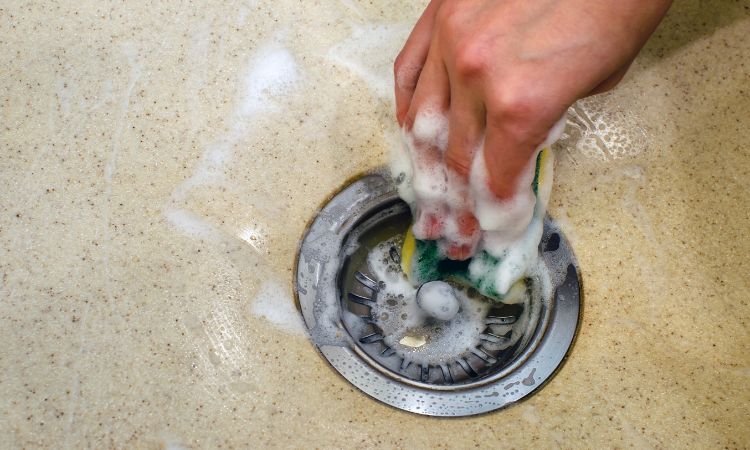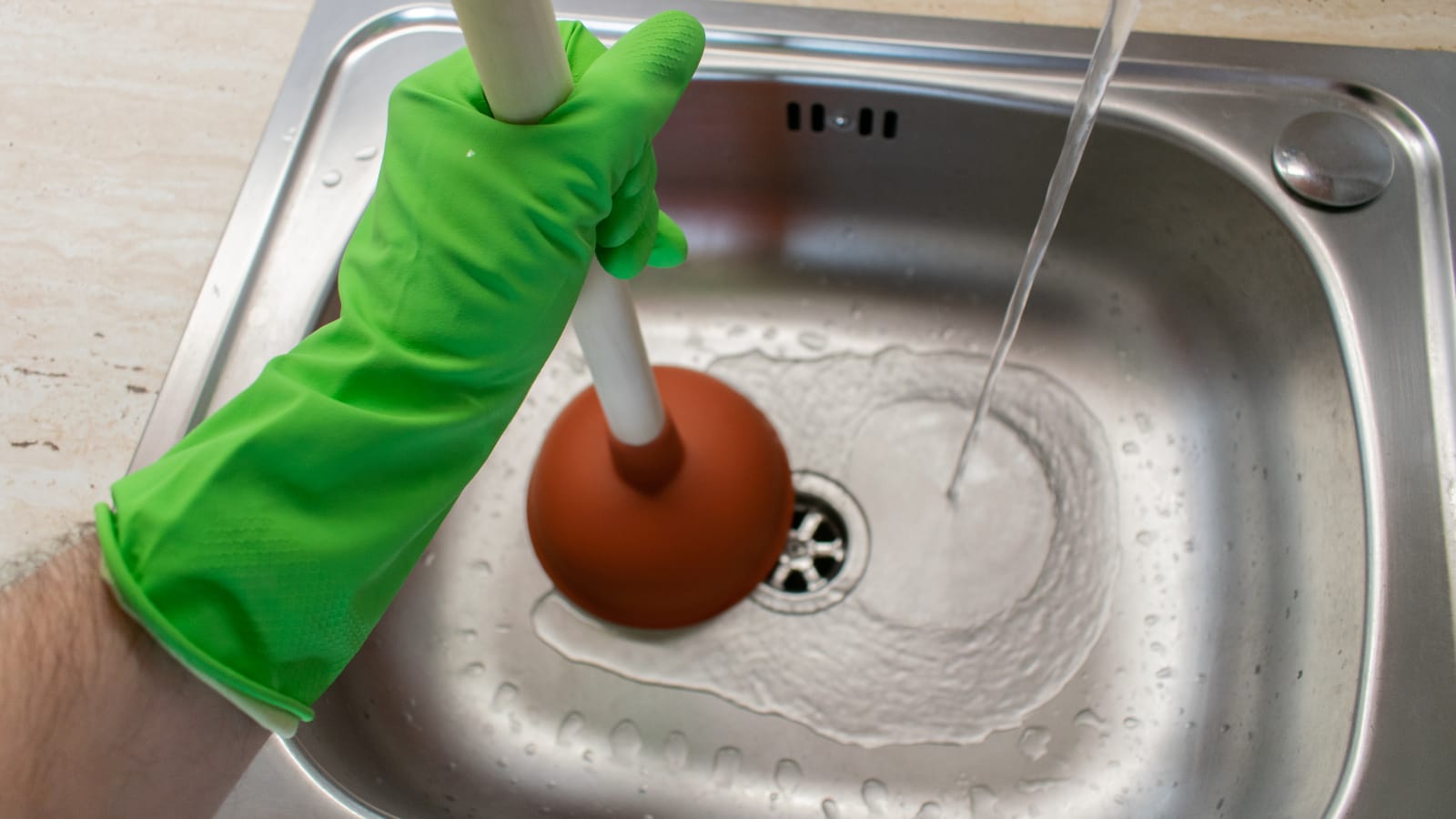Trusted Tips For Repairing A Slow-Draining Sink Fast
Trusted Tips For Repairing A Slow-Draining Sink Fast
Blog Article
We've noticed the article about 7 Ways To Fix A Slow-Draining Sink Before You Call A Plumber down the page on the net and believe it made sense to discuss it with you on this page.

Intro
We've all been there: You're brushing your teeth or washing your hands, and you discover the water merging in the sink. Rather than quickly swirling down the tubes, it lingers, transforming your once-refreshing morning regimen into a small swamp scene. A slow-draining sink isn't simply irritating; it's frequently an indicator of larger plumbing concerns lurking underneath the surface. Fortunately is that the majority of slow-draining sinks can be repaired with a little expertise, a couple of fundamental tools, and some patience. All set to tackle this task head-on? Allow's roll up our sleeves and dive right in.
Comprehending the Causes of a Slow-Draining Sink
Prior to you begin poking around in your pipes, it helps to recognize what may be creating the stagnation. Comprehending the source makes it simpler to select the best fix.
Devices and Products You'll Require
The right tools make all the distinction. Thankfully, you will not need a totally stocked plumbing professional's van to do the job.
Step-by-Step Guide to Taking Care Of a Slow-Draining Sink
Now, allow's enter into the nitty-gritty. This step-by-step procedure will certainly guide you with straightforward techniques to restore your sink's drainage.
Step 1: Get Rid Of and Tidy the Stopper
Frequently, the stopper (that little plug you push down to block water) is the very first perpetrator. Remove it thoroughly and wipe any hair or substance entraped around its base. Wash it thoroughly before placing it back in position.
Step 2: Utilize a Plunger to Remove Particles
Got that plunger prepared? Placement it over the drain and provide it a couple of company pumps. The idea is to produce suction that can loosen up any kind of blockage. If you see littles debris drifting up, you're on the ideal track.
Step 3: Attempt a Drainpipe Serpent or Wire Hanger
If the plunger doesn't work, it's time to highlight the drainpipe serpent. Gently feed it right into the drainpipe and spin as you go. You might really feel some resistance-- that's likely the blockage. Keep twisting and drawing up until you remove the blockage. If you don't have a drainpipe serpent, a corrected wire wall mount can operate in a pinch.
Tip 4: Use a Do It Yourself Drain Cleanser
An all-natural cleaner made from cooking soft drink and vinegar can break down recurring gunk. Pour half a cup of baking soft drink right into the drainpipe, complied with by half a cup of vinegar. Allow it fizz for about 15 minutes, after that flush with hot water. This chain reaction usually does wonders for minor obstructions.
Step 5: Rebuild and Evaluate the Sink
Placed every little thing back with each other and run the faucet. Does the water currently swirl down the drain at a reputable speed? If yes, give yourself a pat on the back. Otherwise, do not misery-- there are still a few even more dress up your sleeve.
Crucial Devices for DIY Services
A bettor is your go-to beginning point. A little, sink-sized bettor develops suction that can dislodge small blockages. For more relentless blockages, a drain snake (sometimes called a plumber's auger) works wonders. A set of gloves, a flashlight, and maybe a pair of safety safety glasses are additionally helpful.
Advised Cleaning Solutions
Light meal soap and warm water can aid break down oily build-up. A mixture of baking soda and vinegar is a time-tested home remedy, and chemical cleansers provide an even more green approach. Keep chemical drain cleansers as a last resort, as they can be harsh on your pipelines.
Typical Perpetrators Behind Slow Drain
So, what's obstructing points up? Commonly, it's a mix of daily particles-- believe hair, soap residue, toothpaste deposit, and leftover food bits. Gradually, these tiny bits build up and cling to the pipeline walls, gradually narrowing the passage and making it harder for water to go through. In many cases, mineral deposits from hard water can additionally include in the substance, creating the ideal tornado for persistent blockages.
When is it Time to Do Something About It?
If you see the water draining slower than common, it's a good concept to interfere faster as opposed to later. Waiting also long might lead to finish blockages, unpleasant smells, or even pipeline damage. If the water takes greater than a few secs to clear out after turning off the faucet, consider it a warning and prepare to place on your do it yourself hat.
Safety And Security First: Safety Measures and Preparations
Prior to you launch into unclogging mode, consider safety. You're handling possibly filthy water and debris, so slip on a set of gloves. If you're making use of chemical cleaners, ensure the space is well-ventilated and adhere to the instructions on the label.
Safety Gear and Office Configuration
Set some old towels or cloths around the sink location to capture splashes. Clear away any type of things that may get in your way, like soap dispensers or tooth brush owners. Make certain you have great illumination-- grab a flashlight if needed.
Alternative Methods for Stubborn Clogs
Not all obstructions are created equivalent. If your sink still rejects to comply, think about these alternate solutions.
Sodium Bicarbonate and Vinegar Approach
We currently discussed this, yet it's worth keeping in mind once more. This mild, environment-friendly method is much safer than chemical cleansers and frequently fairly efficient.
Enzymatic Drain Cleaners
Enzyme-based cleansers make use of natural bacteria to digest organic matter. They're an excellent choice if you're wanting to stay clear of rough chemicals. Simply bear in mind, they might take a bit longer to function their magic.
Chemical Drain Cleaners: Benefits And Drawbacks
Chemical cleaners can blast through tough obstructions fast, however they're not without drawbacks. They can create warmth and fumes, damages pipelines if made use of exceedingly, and posture ecological threats. Utilize them moderately, and always comply with the instructions meticulously.
Preventive Measures to Keep Your Sink Flowing
Prevention is the best remedy. By embracing a couple of basic behaviors, you can keep your sink from decreasing to begin with.
Normal Cleansing Routines
Clean down the sink container and component location frequently. Eliminate hair or food particles before they have a chance to wash down the drainpipe.
Staying Clear Of Damaging Substances Down The Tubes
Reconsider before dumping coffee premises, grease, or fibrous veggie scraps down the sink. These offenders hold on to pipeline wall surfaces, developing clogs over time.
Regular Maintenance Checks
Set up a fast regular monthly inspection. Run hot water with the sink for a couple of mins, taking notice of the flow. If it appears slow, act fast before it comes to be a full-blown clog.
When to Call a Specialist Plumber
In some cases, despite just how hard you try, that clog simply won't move. That's when it's time to bring in the pros.
Indicators That Show an Extra Serious Issue
If your sink drains pipes gradually despite several attempts, or if you discover water backing up in other components (like your shower or bathroom), you may have a more severe pipes concern prowling deeper in the system.
Stabilizing Do It Yourself Efforts with Professional Help
While do it yourself can save you cash and offer a sense of success, there's no shame in calling a professional. A specialist plumber can analyze your whole plumbing arrangement, making sure there's no underlying damage or lasting trouble that might cost you much more in the future.
Contrasting Costs and Long-Term Solutions
Before making a decision, think about the big picture. A low-cost, quick fix may solve the issue briefly, but buying a much more irreversible remedy could conserve you cash and stress and anxiety in the future.
Evaluating the Expenses of Do It Yourself vs. Specialist Repairs
Do it yourself repairs usually cost little greater than the rate of a plunger or a bottle of cooking soft drink. Expert solutions, on the other hand, included a price tag however might avoid repetitive issues and expensive repairs later.
Purchasing Top Quality Fixtures and Upgrades
If your sink's design contributes to regular obstructions, it could be worth upgrading to higher-quality components or changing the pipes layout. Consider this an investment in your house's performance and convenience.
Final thought
A slow-draining sink can feel like a small inflammation, yet it's typically an indication that your pipes requires a little TLC. By comprehending the source, utilizing the right tools and methods, and dedicating to basic preventive measures, you can maintain your sink streaming openly. And when all else fails, never ever hesitate to contact a specialist-- your home's pipes is worth the financial investment in treatment and maintenance.
Three Common Ways to Fix a Slow Drain
Baking Soda Method
Boil a full pot of water. Measure out cup of baking soda and pour it down the drain. Then take cup of the magical cleansing substance known as white vinegar and drop that down there too. Allow the mixture to fizz in the drain for five minutes as the vinegar and baking soda combine. Now dump in that whole pot of boiling water. This combination of cleaning substances should clear out anything that is causing your sink to drain slowly. If it doesn t...
Zip-It
If the baking soda method doesn t clear out your drain, it may be because a significant amount of hair and/or other debris has collected there and you need to remove it. Purchase a Zip-It tool at any home improvement or hardware store and insert it into your drain. It will catch any collected hair or debris that s blocking the flow of water. Pull it out. If it s got a big clump of hair, etc. on the end, you ve probably got your culprit.
Drain Cleaner
If these methods don t work, there is the standard drain cleaner that you can also buy in a hardware store or even your local grocery store. It s better if you can use a household solution, but these drain cleaners often work in a pinch. They re very simple to use. You generally just dump them in your drain and wait. If even this method is not effective, it may be time to call the plumber.
https://www.mrrooter.com/oneida/about-us/blog/2017/july/three-common-ways-to-fix-a-slow-drain/

I was made aware of that write-up on Solved! How to Fix a Slow Sink Drain from an associate on our other domain. Sharing is good. One never knows, you may just be helping someone out. We enjoy your readership.
Automated Marketing Report this page